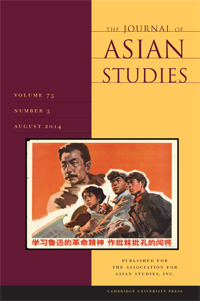Benjamin D. Hopkins, “The Frontier Crimes Regulation and Frontier Governmentality,” The Journal of Asian Studies (March 2015): 1-21.
From the invention of imperial authority along the North-West Frontier of British India, subjects were divided between the “civilized” inhabitants populating the cultivated plains and the “wild tribes” living in the hills. The problem of governing this latter group, the “independent tribes,” proved a vexed one for the British Raj. The mechanism developed by imperial administrators to manage the frontier inhabitants was the Frontier Crimes Regulation (FCR), first promulgated in 1872 and still in effect today. The FCR was designed to exclude the Frontier's inhabitants from the colonial judiciary, and more broadly the colonial sphere, encapsulating them in their own colonially sanctioned “tradition.” Exploring the use of the FCR as an instrument of governance from its first inception into the twentieth century, this article argues that it was key to shaping the nature of frontier rule, which in turn shaped the very nature of the colonial state itself.


